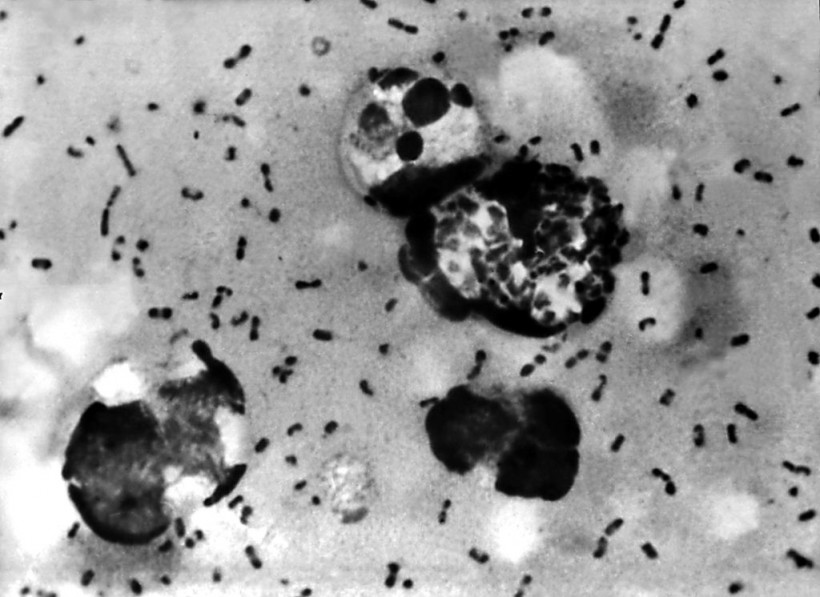What if pathogenic or otherwise invasive creatures from another planet boarded a returning spaceship, an astronaut's spacesuit, or - if space tourism becomes a reality - someone's suitcase? Scientists warn that if biosecurity precautions aren't in place, extraterrestrial microbes on Earth might become a reality scarier than fiction.
Experts believe that extraterrestrial life from another planet might contaminate Earth and vice versa. Researchers detailed the study titled "Planetary Biosecurity: Applying Invasion Science to Prevent Biological Contamination from Space Travel," in BioScience.

UNDATED PHOTO: A bubonic plague smear, prepared from a lymph removed from an adenopathic lymph node, or bubo, of a plague patient demonstrates the presence of the Yersinia pestis bacteria that causes the plague in this undated photo. The FBI has confirmed that about 30 vials that may contain bacteria that could cause bubonic or pneumonic plague have gone missing, then found, from the Health Sciences Center at Texas Tech University on January 15, 2003, in Lubbock, Texas. The plague, considered a likely bioterror agent since it's easy to make, is easily treatable with antibiotics if diagnosed early and properly.
Space Organisms Could Make a Spacecraft Hitch and Invade Earth
Invasive organisms that originated right here have already caused enough havoc where they aren't supposed to be. Pathogens that continue to mutate have fared even worse. Now that there has been so much talk about humans traveling (bravely or not) where no other species has gone before,
Study co-author Anthony Ricciardi of McGill University in Montreal, Canada, told SyFy Wire that a new phase of space study targeting areas most likely to harbor life poses unprecedented hazards. He went on to say that creatures that may colonize and grow in Earth conditions, as well as vice versa, are possible.
When the samples that Perseverance is gathering on Mars are returned to Earth, back contamination will become a bigger issue. Although it is doubtful that anything is still alive on Mars, there may be hypothetical life-forms that have escaped the fatal radiation that everyone else has been subjected to and are buried deep beneath the surface. Because such moons are regarded as having more habitability potential, upcoming trips to Europa, Titan, and Enceladus are riskier. For the time being, Ricciardi is considering ways to keep Earth bacteria from spreading.
The keys to biosecurity are early discovery and prompt action, he stated. DNA sequencing methods and comprehensive databases on organisms discovered in the 'clean rooms' where spaceships are constructed might improve early detection.
The issue is that individuals may not perceive life from other places as living. The life that originated far away from here may have adaptations and genetic architecture that are so unlike anything on Earth that no one recognizes it for what it is.
It may be too late by the time the alien monster starts wreaking havoc on an environment. Even if the invaders aren't harmful, invasive species can lead to the extinction of indigenous species (like cane toads). The most effective weapon someone has against forward or back contamination is prevention.
Space Agencies Aware of Possible Contamination
Ricciardi also told Space.com that space agencies such as NASA have been aware of the possible concerns of biological contamination for many years, and planetary protection measures have been in place since the 1960s. "However, a new phase of space research geared at targeting places most likely to harbor life poses enormous hazards," Ricciardi warned. According to the report, this includes the growth of commercial space exploration businesses like SpaceX, making space more accessible. With the SpaceX Starship program, for example, SpaceX hopes to go to Mars and beyond.
According to the researchers, biosecurity measures related to space flight should be strengthened, emphasizing early detection of possible biological pollutants and the development of strategies for a swift reaction in the event of such detections.
RELATED ARTICLE: What Are The Quarantine Procedures for Astronauts from Space? Here's How Apollo 11 Crew Did It
Check out more news and information on Space in Science Times.














